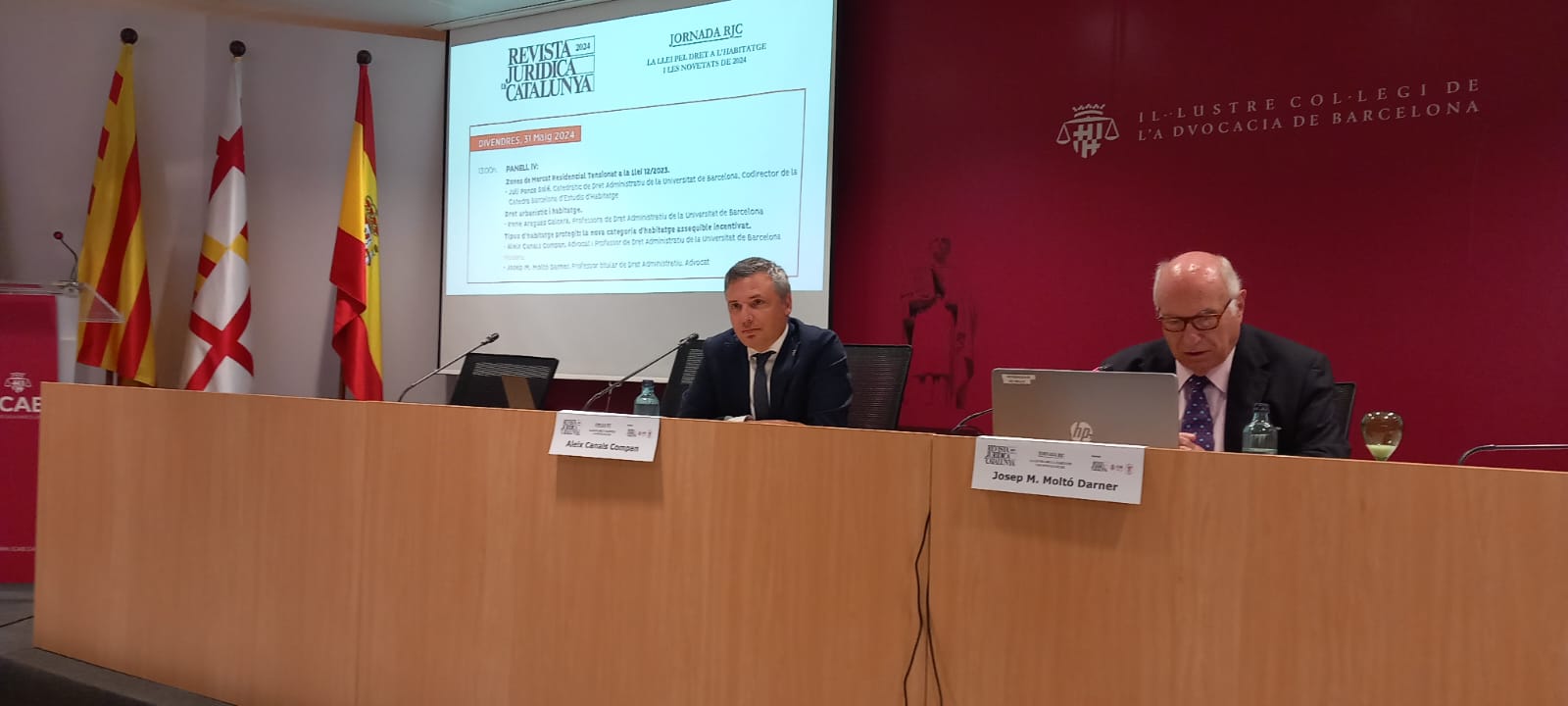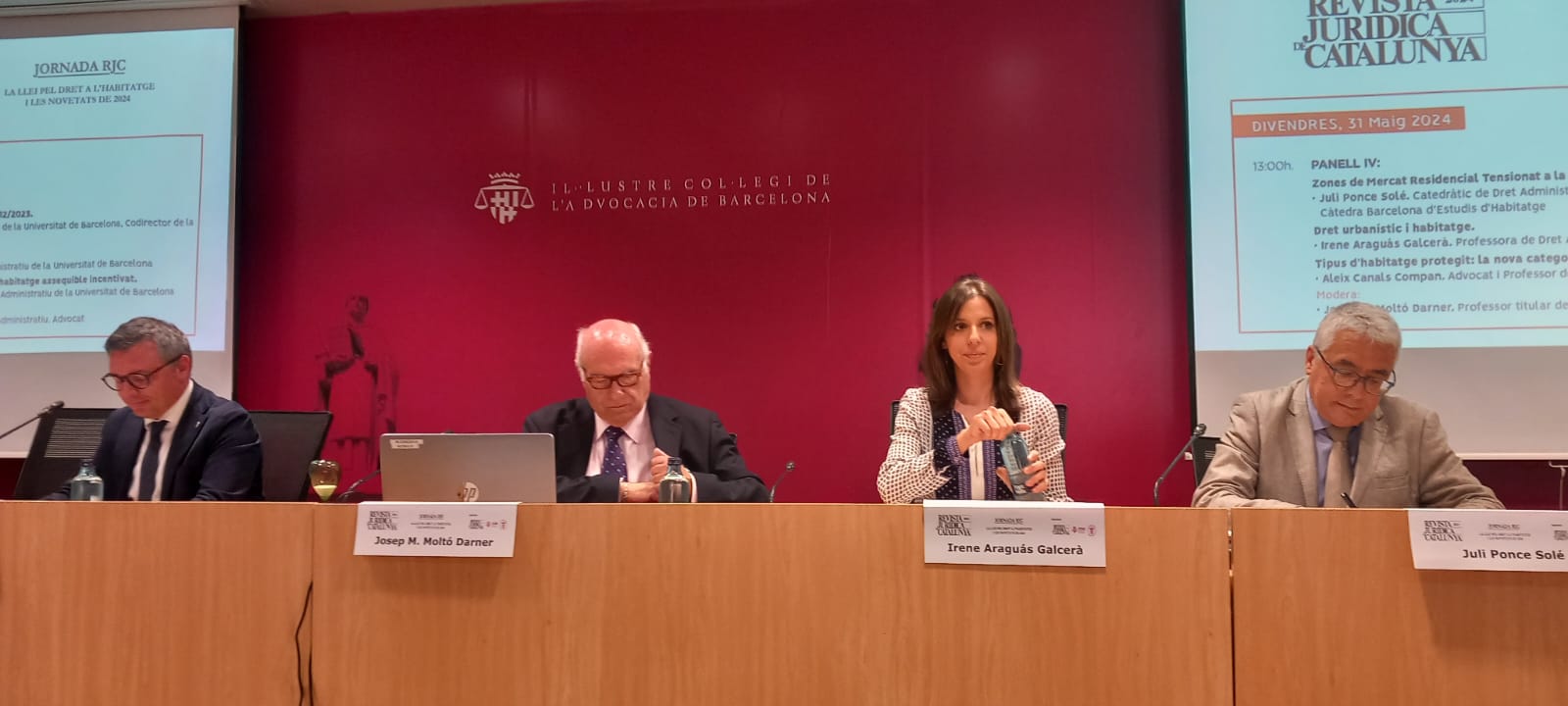On May 31st, the RJC Conference for the presentation of the special issue of the Revista Jurídica de Catalunya titled “The Law for the Right to Housing” was held at the Il·lustre Col·legi de l’Advocacia de Barcelona. Our colleague Aleix Canals contributed to this issue with the article “Types of Protected Housing: The New Category of Incentivized Affordable Housing“. Below is a summary of his presentation:
1. Introduction
What is the relevance of protected housing? It is necessary to link the goal of establishing an affordable housing stock at a price below the market to achieve the objective of urban solidarity. This goal is specified in the Law with short-term measures (such as the declaration of a tense residential market area), medium-term measures (such as the regulation of public housing stocks), and long-term measures (such as the establishment of urban reserves to build official protected housing).
Thus, the public policy of market modulation through the “influence” of the price-limited housing stock is assumed to help moderate demand and, therefore, the market price of “free” housing.
However, it should be noted that this policy requires substantial public investment to develop Officially Protected Housing projects, which are not economically viable without assistance and investment from the Administration.
2. Categories of Protected Housing According to Law 12/2023
Article 16 of Law 12/2023 established different categories of affordable housing, in an effort to systematize and consolidate concepts.
According to a press release dated May 22, 2024, the Plenary of the Constitutional Court agreed to partially uphold, by majority, the unconstitutionality appeal promoted by the Junta de Andalucía against articles 3,f), g), and k), 8,a) and c), 9,e), 11,1,e), 15,1,e), 16, 18 (paragraphs 2, 3, and 4), 19, paragraph 1, second clause and paragraph 3, 27 paragraph 1, third paragraph and paragraph 3, 28, 29, 32, 33, 34, 35, and 36.
The press release states that the Constitutional Court has declared articles 16 and the first DT (which regulates protected housing and, in particular, affordable housing), 19,3 (which regulates the information to be transmitted by large holders), and paragraphs 1 (in part) and 3 of article 27 (in relation to public housing stocks) unconstitutional.
However, the definitions in paragraphs f) and g) of article 3 of the Law, which refer to the definitions of protected housing, social housing, and incentivized affordable housing, are maintained.
In practical terms, we must say that the repeal of article 16 of Law 12/2023 will not substantially change things, because in Catalonia the legal regime of HPOs includes the same characteristics that were configured in Law 12/2023 in articles 77 to 85 of Law 18/2007.
- The housing has a maximum price, below the market price.
- The housing must be intended as habitual residence.
- The allocation of the housing must be done with criteria of transparency and free competition, although certain housing can be reserved for specific social groups.
- The beneficiaries cannot own other housing and must be below the income thresholds that are set.
- The housing cannot be disqualified (if they are on “reserve” land), or can only be disqualified after 30 years (or for exceptional reasons and with the return of all received aids).
- The sale or rental must be expressly authorized by the CA administration, which must ensure that the sale is to persons meeting the requirements and below the maximum price, and in certain cases, there may be a right of first refusal and repurchase.
In Law 12/2023, protected housing is defined (art. 3,f) as: “housing subject to a special regime intended as a habitual residence for people with difficulties accessing the housing market, both in urban and metropolitan areas, and in rural areas“, and two modalities are established: social housing or price-limited housing.”
According to this same provision, price-limited protected housing is defined as housing owned by the public or private sector, excluding public or institutional housing, subject to rent price limitations, intended to meet the housing needs of its users, following its classification through the corresponding procedure.
The same provision 3,f) defines social housing as: housing owned by the public sector intended for rent, use transfer, or another form of temporary tenure. This type of housing can be developed on land designated as facilities and is considered to be for public service. This means it can only be managed by public administrations, non-profit entities (with social aims), and private entities through public-private collaboration formulas.
Within social housing, the category of emergency social housing remains as housing that provides a short-term housing solution temporarily for people at risk of losing their homes.
3. Incentivized Affordable Housing
Incentivized affordable housing is defined as private housing whose owner enjoys some type of advantage or incentive from the administration (urban planning, fiscal or of any other type) in exchange for dedicating it to habitual residence for rent or any temporary form of tenure with use and price limitation, consistent with the benefits obtained.
We could say that it is a “light” or watered-down regime of traditional HPO, with fewer limitations, less rigor, and less regulation.
However, it is desirable to imagine that incentives go beyond fiscal or subsidy incentives and urban planning incentives can be designed to make this formula attractive in the consolidated city.
4. Legal and Competence Controversy
As anticipated, different unconstitutionality appeals have been filed against the Law, according to the Constitutional Court. For now, we know that at least the following have been formulated:
- Representatives of the Popular Parliamentary Group
- Parliament of Catalonia
- By the Government Councils of Andalusia, Balearic Islands, and Madrid
- Government of the Basque Country
- Xunta de Galicia
- Government of the Generalitat
It can be inferred that the arguments of all these appeals – at least as far as Catalonia is concerned – are based on the conclusions of the Statutory Guarantees Council’s reports (hereinafter, CGE), issued on August 3, 2023 (Report 1/2023), and February 16, 2024 (Report 1/2024).
The main reason for the controversy, which affects articles 16 and 17 of Law 12/2023, arises regarding the scope of state and regional competence titles in the matter.
The definitions of the different categories of protected housing given by Law 12/2023 are determined as general principles applicable to this type of housing.
This regulation is based on the state normative titles in the matter, which are:
149,1,1, Regulation of the basic conditions that guarantee the equality of all Spaniards in the exercise of rights and the fulfillment of constitutional duties.
149,1,13 Bases and coordination of the general planning of economic activity.
On the other hand, the Generalitat of Catalonia has full competence to establish the legal regime of officially protected housing derived from the housing powers, which are exclusive to the Generalitat (ex arts. 148,1,3 of the Constitution and 137 of the Statute of Autonomy of Catalonia). As noted by the CGE, the mentioned state competence titles would not seem to support the establishment of a basic legal regime for protected housing (HPO and incentivized affordable housing), which would constitute an intrusion into the powers reserved exclusively for the Generalitat of Catalonia, without any justification. The State Legislator was already aware of this overreach, because the provisions of articles 16 and 17 were formulated programmatically (as general principles, not as imperative norms), and as supplementary.
According to the press release (the judgment has not yet been published), it seems that the Constitutional Court has made an expansive interpretation of the state titles, but without supporting the possibility of regulating the regime of protected housing. This is an issue that will not be resolved with this judgment because the economic infeasibility of protected housing without public aids means that the State (which does have the competence to define aids for HPO) can influence the types of HPO through the definition of the conditions of these houses and their potential beneficiaries, to be able to enjoy the aids.
However, nothing prevents the Generalitat from establishing its own new regulation (similar to the one recently approved through Decree Law 6/2023 by the Balearic Islands), for a type of housing that, while marketed at a limited price, can be classified more agilely and at a price closer to the market, compared to officially protected housing.
5. Conclusion and Future of the Law
We can establish 4 basic ideas:
- Protected Housing is a figure of crucial importance, regulated for over 100 years and requiring the promotion and encouragement by the Public Administrations, that is, public aids, to be economically viable.
- Protected Housing is not only social housing or emergency housing. It is housing for the middle class that may have difficulties accessing free housing.
- The competence controversy that may be resolved with the Constitutional Court’s judgments regarding the unconstitutionality appeals against Law 12/2023 will not eliminate the underlying conflict because the State can influence the regulation of Protected Housing when it defines the Housing aid lines (through the State Plans).
- Incentivized affordable housing does not require further normative development and could be a useful instrument to introduce affordable housing into the market through other promotion formulas that do not necessarily require direct budgetary expenditure.


